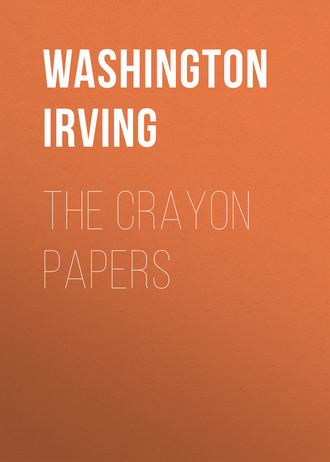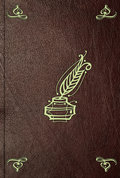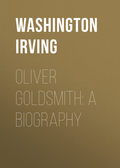
Вашингтон Ирвинг
The Crayon Papers
ENGLISH AND FRENCH CHARACTER
As I am a mere looker on in Europe, and hold myself as much as possible aloof from its quarrels and prejudices, I feel something like one overlooking a game, who, without any great skill of his own, can occasionally perceive the blunders of much abler players. This neutrality of feeling enables me to enjoy the contrasts of character presented in this time of general peace, when the various peoples of Europe, who have so long been sundered by wars, are brought together and placed side by side in this great gathering-place of nations. No greater contrast, however, is exhibited than that of the French and English. The peace has deluged this gay capital with English visitors of all ranks and conditions. They throng every place of curiosity and amusement; fill the public gardens, the galleries, the cafes, saloons, theaters; always herding together, never associating with the French. The two nations are like two threads of different colors, tangled together but never blended.
In fact they present a continual antithesis, and seem to value themselves upon being unlike each other; yet each have their peculiar merits, which should entitle them to each other's esteem. The French intellect is quick and active. It flashes its way into a subject with the rapidity of lightning; seizes upon remote conclusions with a sudden bound, and its deductions are almost intuitive. The English intellect is less rapid, but more persevering; less sudden, but more sure in its deductions. The quickness and mobility of the French enable them to find enjoyment in the multiplicity of sensations. They speak and act more from immediate impressions than from reflection and meditation. They are therefore more social and communicative; more fond of society, and of places of public resort and amusement. An Englishman is more reflective in his habits. He lives in the world of his own thoughts, and seems more self-existent and self-dependent. He loves the quiet of his own apartment; even when abroad, he in a manner makes a little solitude around him by his silence and reserve; he moves about shy and solitary, and, as it were, buttoned up, body and soul.
The French are great optimists; they seize upon every good as it flies, and revel in the passing pleasure. The Englishman is too apt to neglect the present good, in preparing against the possible evil. However adversities may lower, let the sun shine but for a moment, and forth sallies the mercurial Frenchman, in holiday dress and holiday spirits, gay as a butterfly, as though his sunshine were perpetual; but let the sun beam never so brightly, so there be but a cloud in the horizon, the wary Englishman ventures forth distrustfully, with his umbrella in his hand.
The Frenchman has a wonderful facility at turning small things to advantage. No one can be gay and luxurious on smaller means; no one requires less expense to be happy. He practices a kind of gilding in his style of living, and hammers out every guinea into gold leaf. The Englishman, on the contrary, is expensive in his habits, and expensive in his enjoyments. He values everything, whether useful or ornamental, by what it costs. He has no satisfaction in show, unless it be solid and complete. Everything goes with him by the square foot. Whatever display he makes, the depth is sure to equal the surface.
The Frenchman's habitation, like himself, is open, cheerful, bustling, and noisy. He lives in a part of a great hotel, with wide portal, paved court, a spacious dirty stone staircase, and a family on every floor. All is clatter and chatter. He is good-humored and talkative with his servants, sociable with his neighbors, and complaisant to all the world. Anybody has access to himself and his apartments; his very bedroom is open to visitors, whatever may be its state of confusion; and all this not from any peculiarly hospitable feeling, but from that communicative habit which predominates over his character.
The Englishman, on the contrary, ensconces himself in a snug brick mansion, which he has all to himself; locks the front door; puts broken bottles along his walls, and spring guns and man-traps in his gardens; shrouds himself with trees and window-curtains; exults in his quiet and privacy, and seems disposed to keep out noise, daylight, and company. His house, like himself, has a reserved, inhospitable exterior; yet whoever gains admittance is apt to find a warm heart and warm fireside within.
The French excel in wit, the English in humor; the French have gayer fancy, the English richer imagination. The former are full of sensibility; easily moved, and prone to sudden and great excitement; but their excitement is not durable; the English are more phlegmatic; not so readily affected, but capable of being aroused to great enthusiasm. The faults of these opposite temperaments are that the vivacity of the French is apt to sparkle up and be frothy, the gravity of the English to settle down and grow muddy. When the two characters can be fixed in a medium, the French kept from effervescence and the English from stagnation, both will be found excellent.
This contrast of character may also be noticed in the great concerns of the two nations. The ardent Frenchman is all for military renown; he fights for glory, that is to say, for success in arms. For, provided the national flag is victorious, he cares little about the expense, the injustice, or the inutility of the war. It is wonderful how the poorest Frenchman will revel on a triumphant bulletin; a great victory is meat and drink to him; and at the sight of a military sovereign, bringing home captured cannon and captured standards, he throws up his greasy cap in the air, and is ready to jump out of his wooden shoes for joy.
John Bull, on the contrary, is a reasoning, considerate person. If he does wrong, it is in the most rational way imaginable. He fights because the good of the world requires it. He is a moral person, and makes war upon his neighbor for the maintenance of peace and good order, and sound principles. He is a money-making personage, and fights for the prosperity of commerce and manufactures. Thus the two nations have been fighting, time out of mind, for glory and good. The French, in pursuit of glory, have had their capital twice taken; and John, in pursuit of good, has run himself over head and ears in debt.
THE TUILERIES AND WINDSOR CASTLE
I have sometimes fancied I could discover national characteristics in national edifices. In the Chateau of the Tuileries, for instance, I perceive the same jumble of contrarieties that marks the French character; the same whimsical mixture of the great and the little; the splendid and the paltry, the sublime and the grotesque. On visiting this famous pile, the first thing that strikes both eye and ear is military display. The courts glitter with steel-clad soldiery, and resound with the tramp of horse, the roll of drum, and the bray of trumpet. Dismounted guardsmen patrol its arcades, with loaded carbines, jingling spears, and clanking sabers. Gigantic grenadiers are posted about its staircases; young officers of the guards loll from the balconies, or lounge in groups upon the terraces; and the gleam of bayonet from window to window, shows that sentinels are pacing up and down the corridors and ante-chambers. The first floor is brilliant with the splendors of a court. French taste has tasked itself in adorning the sumptuous suites of apartments; nor are the gilded chapel and the splendid theater forgotten, where piety and pleasure are next-door neighbors, and harmonize together with perfect French bienseance.
Mingled up with all this regal and military magnificence is a world of whimsical and make-shift detail. A great part of the huge edifice is cut up into little chambers and nestling-places for retainers of the court, dependents on retainers, and hangers-on of dependents. Some are squeezed into narrow entre-sols, those low, dark, intermediate slices of apartments between floors, the inhabitants of which seem shoved in edgewise, like books between narrow shelves; others are perched like swallows, under the eaves; the high roofs, too, which are as tall and steep as a French cocked hat, have rows of little dormant windows, tier above tier, just large enough to admit light and air for some dormitory, and to enable its occupant to peep out at the sky. Even to the very ridge of the roof may be seen here and there one of these air-holes, with a stove pipe beside it, to carry off the smoke from the handful of fuel with which its weazen-faced tenant simmers his demi-tasse of coffee.
On approaching the palace from the Pont Royal, you take in at a glance all the various strata of inhabitants; the garreteer in the roof; the retainer in the entre-sol; the courtiers at the casements of the royal apartments; while on the ground-floor a steam of savory odors and a score or two of cooks, in white caps, bobbing their heads about the windows, betray that scientific and all-important laboratory, the Royal Kitchen.
Go into the grand ante-chamber of the royal apartments on Sunday and see the mixture of Old and New France; the old emigrés, returned with the Bourbons; little withered, spindle-shanked old noblemen, clad in court dresses, that figured in these saloons before the revolution, and have been carefully treasured up during their exile; with the solitaires and ailes de pigeon of former days; and the court swords strutting out behind, like pins stuck through dry beetles. See them haunting the scenes of their former splendor, in hopes of a restitution of estates, like ghosts haunting the vicinity of buried treasure; while around them you see the Young France, that have grown up in the fighting school of Napoleon; all equipped en militaire; tall, hardy, frank, vigorous, sunburned, fierce-whiskered; with tramping boots, towering crests, and glittering breast-plates.
It is incredible the number of ancient and hereditary feeders on royalty said to be housed in this establishment. Indeed all the royal palaces abound with noble families returned from exile, and who have nestling-places allotted them while they await the restoration of their estates, or the much-talked-of law indemnity. Some of them have fine quarters, but poor living. Some families have but five or six hundred francs a year, and all their retinue consists of a servant-woman. With all this, they maintain their old aristocratical hauteur, look down with vast contempt upon the opulent families which have risen since the revolution; stigmatize them all as parvenues or upstarts, and refuse to visit them.
In regarding the exterior of the Tuileries, with all its outward signs of internal populousness, I have often thought what a rare sight it would be to see it suddenly unroofed, and all its nooks and corners laid open to the day. It would be like turning up the stump of an old tree, and dislodging the world of grubs, and ants, and beetles lodged beneath. Indeed there is a scandalous anecdote current that in the time of one of the petty plots, when petards were exploded under the windows of the Tuileries, the police made a sudden investigation of the palace at four o'clock in the morning; when a scene of the most whimsical confusion ensued. Hosts of supernumerary inhabitants were found foisted into the huge edifice; every rat-hole had its occupant; and places which had been considered as tenanted only by spiders were found crowded with a surreptitious population. It is added that many ludicrous accidents occurred; great scampering and slamming of doors, and whisking away in nightgowns and slippers; and several persons, who were found by accident in their neighbors' chambers, evinced indubitable astonishment at the circumstance.
As I have fancied I could read the French character in the national palace of the Tuileries, so I have pictured to myself some of the traits of John Bull in his royal abode of Windsor Castle. The Tuileries, outwardly a peaceful palace, is in effect a swaggering military hold; while the old castle, on the contrary, in spite of its bullying look, is completely under petticoat government. Every corner and nook is built up into some snug, cozy nestling place, some "procreant cradle," not tenanted by meager expectants or whiskered warriors, but by sleek placemen; knowing realizers of present pay and present pudding; who seem placed there not to kill and destroy, but to breed and multiply. Nursery maids and children shine with rosy faces at the windows, and swarm about the courts and terraces. The very soldiers have a pacific look, and when off duty may be seen loitering about the place with the nursery-maids; not making love to them in the gay gallant style of the French soldiery, but with infinite bonhomie aiding them to take care of the broods of children.
Though the old castle is in decay, everything about it thrives; the very crevices of the walls are tenanted by swallows, rooks, and pigeons, all sure of quiet lodgment; the ivy strikes its roots deep in the fissures, and flourishes about the mouldering tower.2 Thus it is with honest John; according to his own account, he is ever going to ruin, yet everything that lives on him thrives and waxes fat. He would fain be a soldier, and swagger like his neighbors; but his domestic, quiet-loving, uxorious nature continually gets the upper hand; and though he may mount his helmet and gird on his sword, yet he is apt to sink into the plodding, painstaking father of a family; with a troop of children at his heels, and his womenkind hanging on each arm.
THE FIELD OF WATERLOO
I have spoken heretofore with some levity of the contrast that exists between the English and French character; but it deserves more serious consideration. They are the two great nations of modern times most diametrically opposed, and most worthy of each other's rivalry; essentially distinct in their characters, excelling in opposite qualities, and reflecting luster on each other by their very opposition. In nothing is this contrast more strikingly evinced than in their military conduct. For ages have they been contending, and for ages have they crowded each other's history with acts of splendid heroism. Take the Battle of Waterloo, for instance, the last and most memorable trial of their rival prowess. Nothing could surpass the brilliant daring on the one side, and the steadfast enduring on the other. The French cavalry broke like waves on the compact squares of English infantry. They were seen galloping round those serried walls of men, seeking in vain for an entrance; tossing their arms in the air, in the heat of their enthusiasm, and braving the whole front of battle. The British troops, on the other hand, forbidden to move or fire, stood firm and enduring. Their columns were ripped up by cannonry; whole rows were swept down at a shot; the survivors closed their ranks, and stood firm. In this way many columns stood through the pelting of the iron tempest without firing a shot; without any action to stir their blood or excite their spirits. Death thinned their ranks, but could not shake their souls.
A beautiful instance of the quick and generous impulses to which the French are prone, is given in the case of a French cavalier, in the hottest of the action, charging furiously upon a British officer, but perceiving in the moment of assault that his adversary had lost his sword-arm, dropping the point of his saber, and courteously riding on. Peace be with that generous warrior, whatever were his fate! If he went down in the storm of battle, with the foundering fortunes of his chieftain, may the turf of Waterloo grow green above his grave! and happier far would be the fate of such a spirit, to sink amid the tempest, unconscious of defeat, than to survive and mourn over the blighted laurels of his country.
In this way the two armies fought through a long and bloody day. The French with enthusiastic valor, the English with cool, inflexible courage, until Fate, as if to leave the question of superiority still undecided between two such adversaries, brought up the Prussians to decide the fortunes of the field.
It was several years afterward that I visited the field of Waterloo. The plowshare had been busy with its oblivious labors, and the frequent harvest had nearly obliterated the vestiges of war. Still the blackened ruins of Hoguemont stood, a monumental pile, to mark the violence of this vehement struggle. Its broken walls, pierced by bullets, and shattered by explosions, showed the deadly strife that had taken place within; when Gaul and Briton, hemmed in between narrow walls, hand to hand and foot to foot, fought from garden to courtyard, from courtyard to chamber, with intense and concentrated rivalship. Columns of smoke turned from this vortex of battle as from a volcano: "it was," said my guide, "like a little hell upon earth." Not far off, two or three broad spots of rank, unwholesome green still marked the places where these rival warriors, after their fierce and fitful struggle, slept quietly together in the lap of their common mother earth. Over all the rest of the field peace had resumed its sway. The thoughtless whistle of the peasant floated on the air, instead of the trumpet's clangor; the team slowly labored up the hillside, once shaken by the hoofs of rushing squadrons; and wide fields of corn waved peacefully over the soldiers' graves, as summer seas dimple over the place where many a tall ship lies buried.
* * * * *
To the foregoing desultory notes on the French military character, let me append a few traits which I picked up verbally in one of the French provinces. They may have already appeared in print, but I have never met with them.
At the breaking out of the revolution, when so many of the old families emigrated, a descendant of the great Turenne, by the name of De Latour D'Auvergne, refused to accompany his relations, and entered into the Republican army. He served in all the campaigns of the revolution, distinguished himself by his valor, his accomplishments, and his generous spirit, and might have risen to fortune, and to the highest honors. He refused, however, all rank in the army, above that of captain, and would receive no recompense for his achievements but a sword of honor. Napoleon, in testimony of his merits, gave him the title of Premier Grenadier de France (First Grenadier of France), which was the only title he would ever bear. He was killed in Germany, in 1809 or '10. To honor his memory, his place was always retained in his regiment, as if he still occupied it; and whenever the regiment was mustered, and the name of De Latour D'Auvergne was called out, the reply was, "Dead on the field of honor!"
PARIS AT THE RESTORATION
Paris presented a singular aspect just after the downfall of Napoleon, and the restoration of the Bourbons. It was filled with a restless, roaming population; a dark, sallow race, with fierce mustaches, black cravats, and feverish, menacing looks; men suddenly thrown out of employ by the return of peace; officers cut short in their career, and cast loose with scanty means, many of them in utter indigence, upon the world; the broken elements of armies. They haunted the places of public resort, like restless, unhappy spirits, taking no pleasure; hanging about, like lowering clouds that linger after a storm, and giving a singular air of gloom to this otherwise gay metropolis.
The vaunted courtesy of the old school, the smooth urbanity that prevailed in former days of settled government and long-established aristocracy, had disappeared amid the savage republicanism of the revolution and the military furor of the empire; recent reverses had stung the national vanity to the quick; and English travelers, who crowded to Paris on the return of peace, expecting to meet with a gay, good-humored, complaisant populace, such as existed in the time of the "Sentimental Journey," were surprised at finding them irritable and fractious, quick at fancying affronts, and not unapt to offer insults. They accordingly inveighed with heat and bitterness at the rudeness they experienced in the French metropolis; yet what better had they to expect? Had Charles II. been reinstated in his kingdom by the valor of French troops; had he been wheeled triumphantly to London over the trampled bodies and trampled standards of England's bravest sons; had a French general dictated to the English capital, and a French army been quartered in Hyde Park; had Paris poured forth its motley population, and the wealthy bourgeoise of every French trading town swarmed to London; crowding its squares; filling its streets with their equipages; thronging its fashionable hotels, and places of amusements; elbowing its impoverished nobility out of their palaces and opera-boxes, and looking down on the humiliated inhabitants as a conquered people; in such a reverse of the case, what degree of courtesy would the populace of London have been apt to exercise toward their visitors?3
On the contrary, I have always admired the degree of magnanimity exhibited by the French on the occupation of their capital by the English. When we consider the military ambition of this nation, its love of glory; the splendid height to which its renown in arms had recently been carried, and with these, the tremendous reverses it had just undergone; its armies shattered, annihilated; its capital captured, garrisoned, and overrun, and that too by its ancient rival, the English, toward whom it had cherished for centuries a jealous and almost religious hostility; could we have wondered if the tiger spirit of this fiery people had broken out in bloody feuds and deadly quarrels; and that they had sought to rid themselves in any way of their invaders? But it is cowardly nations only, those who dare not wield the sword, that revenge themselves with the lurking dagger. There were no assassinations in Paris. The French had fought valiantly, desperately, in the field; but, when valor was no longer of avail, they submitted like gallant men to a fate they could not withstand. Some instances of insult from the populace were experienced by their English visitors; some personal rencontres, which led to duels, did take place; but these smacked of open and honorable hostility. No instances of lurking and perfidious revenge occurred, and the British soldier patroled the streets of Paris safe from treacherous assault.
If the English met with harshness and repulse in social intercourse, it was in some degree a proof that the people are more sincere than has been represented. The emigrants who had just returned were not yet reinstated. Society was constituted of those who had flourished under the late regime; the newly ennobled, the recently enriched, who felt their prosperity and their consequence endangered by this change of things. The broken-down officer, who saw his glory tarnished, his fortune ruined, his occupation gone, could not be expected to look with complacency upon the authors of his downfall. The English visitor, flushed with health, and wealth, and victory, could little enter into the feelings of the blighted warrior, scarred with a hundred battles, an exile from the camp, broken in constitution by the wars, impoverished by the peace, and cast back, a needy stranger in the splendid but captured metropolis of his country.
"Oh! who can tell what heroes feel,
When all but life and honor's lost!"
And here let me notice the conduct of the French soldiery on the dismemberment of the army of the Loire, when two hundred thousand men were suddenly thrown out of employ; men who had been brought up to the camp, and scarce knew any other home. Few in civil, peaceful life, are aware of the severe trial to the feelings that takes place on the dissolution of a regiment. There is a fraternity in arms. The community of dangers, hardships, enjoyments; the participation in battles and victories; the companionship in adventures, at a time of life when men's feelings are most fresh, susceptible, and ardent, all these bind the members of a regiment strongly together. To them the regiment is friends, family, home. They identify themselves with its fortunes, its glories, its disgraces. Imagine this romantic tie suddenly dissolved; the regiment broken up; the occupation of its members gone; their military pride mortified; the career of glory closed behind them; that of obscurity, dependence, want, neglect, perhaps beggary, before them. Such was the case with the soldiers of the army of the Loire. They were sent off in squads, with officers, to the principal towns where they were to be disarmed and discharged. In this way they passed through the country with arms in their hands, often exposed to slights and scoffs, to hunger and various hardships and privations; but they conducted themselves magnanimously, without any of those outbreaks of violence and wrong that so often attend the dismemberment of armies.
* * * * *
The few years that have elapsed since the time above alluded to, have already had their effect. The proud and angry spirits which then roamed about Paris unemployed begins to recover its old channels, though worn deeper by recent torrents. The natural urbanity of the French begins to find its way, like oil, to the surface, though there still remains a degree of roughness and bluntness of manner, partly real, and partly affected, by such as imagine it to indicate force and frankness. The events of the last thirty years have rendered the French a more reflecting people. They have acquired greater independence of mind and strength of judgment, together with a portion of that prudence which results from experiencing the dangerous consequences of excesses. However that period may have been stained by crimes, and filled with extravagances, the French have certainly come out of it a greater nation than before. One of their own philosophers observes that in one or two generations the nation will probably combine the ease and elegance of the old character with force and solidity. They were light, he says, before the revolution; then wild and savage; they have become more thoughtful and reflective. It is only old Frenchmen, nowadays, that are gay and trivial; the young are very serious personages.
* * * * *
P.S. – In the course of a morning's walk, about the time the above remarks were written, I observed the Duke of Wellington, who was on a brief visit to Paris. He was alone, simply attired in a blue frock; with an umbrella under his arm, and his hat drawn over his eyes, and sauntering across the Place Vendome, close by the Column of Napoleon. He gave a glance up at the column as he passed, and continued his loitering way up the Rue de la Paix; stopping occasionally to gaze in at the shop-windows; elbowed now and then by other gazers, who little suspected that the quiet, lounging individual they were jostling so unceremoniously was the conqueror who had twice entered their capital victoriously; had controlled the destinies of the nation, and eclipsed the glory of the military idol, at the base of whose column he was thus negligently sauntering.
Some years afterward I was at an evening's entertainment given by the duke at Apsley House, to William IV. The duke had manifested his admiration of his great adversary, by having portraits of him in different parts of the house. At the bottom of the grand staircase stood the colossal statue of the emperor, by Canova. It was of marble, in the antique style, with one arm partly extended, holding a figure of victory. Over this arm the ladies, in tripping upstairs to the ball, had thrown their shawls. It was a singular office for the statue of Napoleon to perform in the mansion of the Duke of Wellington!
"Imperial Caesar dead, and turned to clay," etc., etc.







